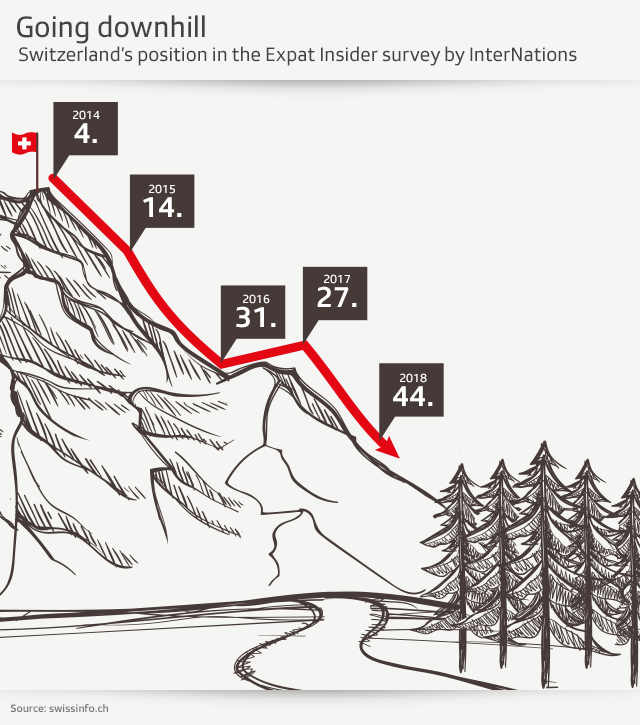
Switzerland named among biggest losers in expat survey

Switzerland is now the 44th best country to live as an expat, sandwiched between Ireland and Hungary, according to an annual survey which highlights the challenges and cold realities of life in the Alpine nation.
Let’s start with the good news. In the InterNationsExternal link Expat Survey 2018, published on Thursday, Switzerland once again did particularly well in political stability (2nd out of 68 countries), quality of environment (3rd), travel opportunities and transportation infrastructure (4th), children’s safety (5th), peacefulness (6th) and personal safety (9th).
The bad news is that the impressions of expats living in Switzerland have worsened across all five indices: quality of life, ease of settling in, working abroad, family life and personal finance.
+ Who is an expat? Searching for a definition
“Switzerland has lost 40 places over the past five years. That’s a big decline,” admits Malte Zeeck, the German founder and co-CEO of InterNations. “I think the biggest reason is the ease of settling in. It’s always been bad in this respect, but now it’s 65th [only Germany, Saudi Arabia and Kuwait do worse]. We see that 37% of expats in Switzerland say they don’t feel at home in the Swiss culture, compared with a global average of 24%.”

Only Romania and Sweden dropped more places this year than Switzerland (which tied with Hong Kong).
Zeeck also points out that 62% say it’s hard to make local friends (at a global level it’s only 36%) and 26% say it’s very hard (globally 13%).
“Swiss people – at least this is how it’s perceived – prefer to stick with their friends from university, from military service, from their different social circles and are not necessarily open to people who come from abroad,” he told swissinfo.ch.
Job (dis)satisfaction
While Switzerland was a top destination for career-driven expats just a few years ago, it seems to have lost some of its appeal: about a fifth of respondents express dissatisfaction with their jobs in general (19%) as well as working hours, work-life balance, and job security (all 21%). Slightly more than a quarter (26%) say that they are unhappy about their career prospects in Switzerland.

More
Expats in Switzerland like the safety but not the locals
But doesn’t that mean that the overwhelming majority of expats are satisfied and happy with their jobs?
“Absolutely,” Zeeck agrees. “There are always some people who aren’t happy with their job prospects, their career options. It’s just that over the past five years Switzerland has lost quite a bit. So for career chances in 2014 it was 14th and now it’s 37th. Also general job satisfaction has dropped from 21st to 36th. So there’s been a big decline, but Switzerland is still a good place to work.”
Expats in Switzerland continue to be dissatisfied with language-related aspects (51st), feeling at home (61st), friendliness of the locals (64th), finding friends (65th) and cost of living (67th).
“On the one hand, the costs of living are perceived as very high,” Zeeck says. “More than 65% find the cost of living in Switzerland too high, compared with 31% at a global level. So that’s definitely a challenge. But at the same time we see that the available household income in Switzerland is a lot higher than in other regions of the world: 60% say they have at least $100,000 (CHF97,500), compared with a global average of only 24%.”
In addition, the country has received its worst results yet in terms of family life, dropping 14 positions from 20th in 2014 to a below-average 34th place out of 50 countries in 2018. Switzerland’s biggest weakness seems to lie with the options, availability and affordability of childcare (43%, 61% and 74% negative responses). Expat parents’ opinions regarding the friendly attitude towards families with children is also below average (16% negative responses versus 7% globally).
While expats in Switzerland are increasingly unsatisfied with their lot, those in Bahrain were happy across the board. The small Gulf state thus defended its position as the world’s most popular expat destination ahead of Taiwan and Ecuador.
At the other end of the scale, in descending order, were India, Saudi Arabia and Kuwait (to be listed in the overall ranking at least 75 survey participants per destination were necessary).
Downward spiral?
So, will things continue to get worse for expats in Switzerland, and what does the country need to do to improve its position?
“One thing that’s very hard to change is this whole welcoming culture because by nature Swiss, Germans and Austrians are simply not as – let’s say – warm, open and friendly as Latin Americans, Spanish or Portuguese people,” Zeeck says.
“I think it helps a lot to welcome people from other countries and to engage with them – to be open to making new friends – but it’s not as if the government can influence this. However, there are other ways this can be done. We looked at the topic of digital life, for example, where Switzerland is ranking in the midfield – so how easy is it to do your admin online, how easy is it to get a local mobile phone number or high-speed internet access or cashless payment options and so on. This helps expats quite a lot and that’s certainly an area where the government can do something very directly.”
As for next year’s ranking, Zeeck says Switzerland is already low down “and in some categories it probably can’t go any lower because only Kuwait and Saudi Arabia are below it!”
“But there are some really great things about Switzerland where it always rates really well: the economy, the environment, safety and stability, health and medical care – so I hope the trend goes back in the other direction.”
Expat Insider 2018
The Expat Insider 2018 survey was conducted online by InterNations between February 15 and March 7, 2018.
The target audience included all kinds of expatriates: foreign assignees (“expats” in the classical sense of employees on a corporate assignment) and people living and working abroad for various other reasons, members of the InterNations network and expats in general.
A total of 18,135 expatriates took part, representing 178 nationalities living in 187 countries or territories.
For a country to be listed in any of the indices and in the overall ranking, a sample size of at least 75 survey participants per destination was necessary. The only exception to this rule is the Family Life Index, where a sample size of at least 40 respondents raising children abroad was required.
The higher number of respondents means that the league tables cover even more expat destinations: 68 in the overall ranking and 50 in the Family Life index.
51% of respondents were female, 66% were in a relationship, 77% were without dependent children abroad, 82% had a university degree. The average age was 44.2.
(Source: InterNations)

More
What the Swiss can teach us about quality of life

In compliance with the JTI standards
More: SWI swissinfo.ch certified by the Journalism Trust Initiative































You can find an overview of ongoing debates with our journalists here . Please join us!
If you want to start a conversation about a topic raised in this article or want to report factual errors, email us at english@swissinfo.ch.